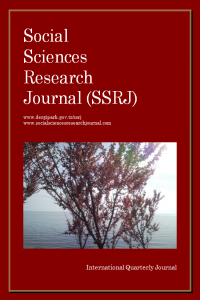How Terrorist Attacks Affect Voter Turnout Rate In Turkey: Regional Analysis?
Voter Turnout, Terrorism, Fixed Effect Model
How Terrorist Attacks Affect Voter Turnout Rate In Turkey: Regional Analysis?
Voter turnout, Terrorism, Fixed Effect Model,
___
- Akarca, Ali and Aysit Tansel. 2006. Economic Performance and Political Outcomes: An Analysis of the Turkish Parliamentary and Local Election Results Between 1950 and 2004. Public Choice 129:77-105. Akarca, Ali and Aysit Tansel. 2007. Social and Economic Determinants of Turkish Voter Choice in the 1995 Parliamentary Election. Electoral Studies 26: 633-647. Bali A Valientine, 2007, “Terror and Elections: Lessons from Spain”, Electoral Studies, Volume 26(3),669-687 Baslevent,Cem et al, 2005, Empirical investigation of party preferences and economic voting in Turkey, European Journal of Political Research, Volume 44, Issue 4, pages 547–562.
- Blais A. 2000. To Vote Or Not To Vote? The Merits and Limits of Rational Choice. Pittsburgh: Univ. Pittsburgh Press
- Blais A, Dobrzynska A. 1998. Turnout in electoral democracies. Eur. J. Polit. Res. 33:239– 61
- Çarkoğlu, Ali. 1997. Macroeconomic Determinants of Electoral Support for Incumbents in Turkey, 1950-1995. New Perspectives on Turkey 17:75-96.
- Denny, Kevin J; Doyle, Orla, 2007, “…Take up thy bed, and vote” Measuring the relationship between voting behaviour and indicators of health”, The European Journal of Public Health,Vol 1, 400-401 Downs, A. 1957. An Economic Theory of Democracy. New York: Harper and Row. Eisinga R.,Grotenhuis M,Pelzer B, 2012, Weather conditions and voter turnout in Dutch national parliament elections, 1971–2010, International Journal of Biometeorology, Vol.56, Issue 4, pp 783-786 Fornos, Carolina; Power, Timothy; Garand, James,2004, Explaing Voter Turnout in Latin America 1980 to 2000, Comparative Political Studies October 2004 vol. 37( 8), 909-940 Gomez B, Hansford T, Krause G., 2007,The Republicans Should Pray for Rain: Weather, Turnout, and Voting in U.S. Presidential Elections, Journal of Politics, Vol. 69, No.3,647-661 Filer et all, 1993, “Redistribution, Income, and Voting”, American Journal of Political Science, Volume 2(1), 63-87 Filiztekin, Alpay, 1999, Convergence across Turkish provinces and sectoral dynamics. Background paper for Turkey: Economic Reforms, Living Standards and Social Welfare Study, World Bank Report, Poverty Reduction and Economic Management Unit, World Bank.
- Yayın Aralığı: Yılda 4 Sayı
- Yayıncı: Denta Florya ADSM Limited Company
İŞGÜCÜ PİYASASINDA GÜVENCELİ-ESNEKLİK MODELİ VE PİYASA ARAÇLARININ İSTİHDAMA ETKİLERİ
Seyhun DOĞAN, Mehmet Sencer GİRGİN
Ekonomik Büyüme – İhracat İlişkisi: 2001-2016 Türkiye Örneği
How Terrorist Attacks Affect Voter Turnout Rate In Turkey: Regional Analysis?
BİR SAĞLIK TURİZMİ DESTİNASYONU OLARAK TRAKYA BÖLGESİ
The Association between Corruption and Globalization in African Countries
Julide Yalçınkaya KOYUNCU, Mustafa ÜNVER
Sunflower Production and Agricultural Policies in Turkey
Söylem, Temsil, Faillik ve Anlatı: Yeni Yoksulluk Literatürünün Bir Eleştirisi
Asakir-i Mansure-i Muhammediye Ordusuna Asker Alımı (Hamid Sancağı ve Isparta Örneği)
